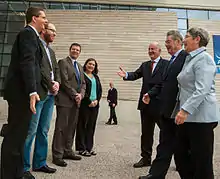Heinz Fischer
Heinz Fischer GColIH OMRI RSerafO GCollSE (German pronunciation: [haɪnts ˈfɪʃɐ] (![]() listen); born 9 October 1938 in Graz, Styria) is a former Austrian politician. He took office as President of Austria on 8 July 2004 and was re-elected for a second and last term on 25 April 2010, leaving office on 8 July 2016. Fischer previously served as minister of science from 1983 to 1987 and as president of the National Council of Austria from 1990 to 2002. A member of the Social Democratic Party of Austria (SPÖ), he suspended his party membership for the duration of his presidency.[1][2]
listen); born 9 October 1938 in Graz, Styria) is a former Austrian politician. He took office as President of Austria on 8 July 2004 and was re-elected for a second and last term on 25 April 2010, leaving office on 8 July 2016. Fischer previously served as minister of science from 1983 to 1987 and as president of the National Council of Austria from 1990 to 2002. A member of the Social Democratic Party of Austria (SPÖ), he suspended his party membership for the duration of his presidency.[1][2]
Heinz Fischer | |
|---|---|
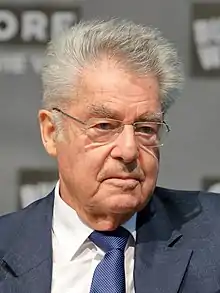 | |
| President of Austria | |
| In office 8 July 2004 – 8 July 2016 | |
| Chancellor | |
| Preceded by | Thomas Klestil |
| Succeeded by | Alexander Van der Bellen |
| Second President of the National Council | |
| In office 20 December 2002 – 16 June 2004 | |
| Preceded by | Thomas Prinzhorn |
| Succeeded by | Barbara Prammer |
| President of the National Council | |
| In office 5 November 1990 – 20 December 2002 | |
| Preceded by | Rudolf Pöder |
| Succeeded by | Andreas Khol |
| Minister of Science and Research | |
| In office 24 May 1983 – 21 January 1987 | |
| Chancellor | |
| Preceded by | Hertha Firnberg |
| Succeeded by | Hans Tuppy |
| Personal details | |
| Born | 9 October 1938 Graz, Reichsgau Steiermark, State of Austria, Nazi Germany (now Graz, Styria, Austria) |
| Political party | Independent (since 2004) |
| Other political affiliations | Social Democratic Party (before 2004) |
| Spouse(s) | Margit Binder |
| Children | 2 |
| Alma mater | University of Vienna |
| Awards | Order of Merit of the Italian Republic Order of Prince Henry Royal Order of the Seraphim Military Order of Saint James of the Sword |
Early life
Fischer was born in Graz, Styria, which had recently become part of Nazi Germany, following Germany’s annexation of Austria in March 1938. Fischer attended a grammar school which focused on humanities and graduated in 1956. He studied law at the University of Vienna, earning a doctorate in 1961. In 1963, at the age of 25, Fischer spent a year volunteering at Kibbutz Sarid, northern Israel.[3] Apart from being a politician, Fischer also pursued an academic career, and became a professor of Political Science at the University of Innsbruck in 1994.[4]
Political career
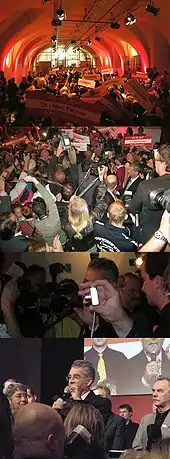
Fischer was a member of the Austrian parliament, the National Council, from 1971, and served as its president from 1990 to 2002. From 1983 to 1987 he was minister of science in a coalition government headed by Fred Sinowatz.
First term as president
In January 2004 Fischer announced that he would run for president to succeed Thomas Klestil. He was elected on 25 April 2004 as the candidate of the opposition Social Democratic Party. He polled 52.4 per cent of the votes to defeat Benita Ferrero-Waldner, then foreign minister in the ruling conservative coalition led by the People's Party.
Fischer was sworn in on 8 July 2004 and took over office from the college of presidents of the National Council, who had acted for the president following Klestil's death on 6 July.
Fischer's critics, foremost among them Norbert Leser, his university colleague, have derided him as a career politician (Berufspolitiker) who has never been in touch with the real world. They claim that Fischer has always avoided controversy and conflict, even when that seemed required, pointing to Fischer's tacit support for Bruno Kreisky in his attacks on Simon Wiesenthal. On being nominated for president, Fischer said that he hated antagonising people and that he considered this quality an asset rather than anything else.
Second term as president
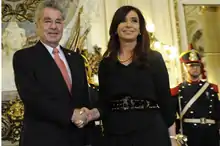
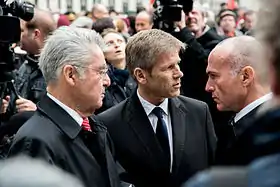
In April 2010, Fischer was re-elected president of Austria, winning a second six-year term in office with almost 79% of the votes. The voter turnout of merely 53.6% was a record low.[5] Around a third of those eligible to vote voted for Fischer, leading the conservative daily Die Presse to describe the election as an "absolute majority for non-voters".[6] The reasons behind the low turnout may have been that pollsters had predicted a safe victory for Fischer (past Austrian presidents running for a second term had always won) and that the other large party, ÖVP, had not nominated a candidate of their own, and had not endorsed any of the three candidates. Prominent ÖVP members, unofficially but in public, even suggested to cast a blank vote, which 7% of the voters did.
Personal life
.svg.png.webp)
Fischer identifies himself as agnostic[8] and as a social democrat. Heinz Fischer and Margit Binder married in 1968. The couple have two grown children.
Fischer enjoys mountaineering and has been president of the Austrian Friends of Nature for many years.
Honours and awards
Federal Order
- 2004
 Grand Star of Honour of the Decoration for Services to the Republic of Austria (Austria)
Grand Star of Honour of the Decoration for Services to the Republic of Austria (Austria)
State Honours
- 2008 Ring of Honour of the Province of Styria
- 2008 Freedom of the City of Graz
Awards
- 2009 Florianiplakette of the Austrian Federal Fire Association in gold
Foreign Orders
- 1993
 Knight Grand Cross of the Order of Merit of the Italian Republic (Italy)
Knight Grand Cross of the Order of Merit of the Italian Republic (Italy) - 2005
 Grand Collar of the Order of Prince Henry (Portugal)[9]
Grand Collar of the Order of Prince Henry (Portugal)[9] - 2005
 Grand Cross of the Order of Isabella the Catholic (Spain)
Grand Cross of the Order of Isabella the Catholic (Spain) - 2006
 Grand Cross of the Order of the Order of the White Rose of Finland (Finland)
Grand Cross of the Order of the Order of the White Rose of Finland (Finland) - 2006
_1class_Collar_BAR.svg.png.webp) Grand Cross with Collar of the Order of Merit of the Republic of Hungary (Hungary)
Grand Cross with Collar of the Order of Merit of the Republic of Hungary (Hungary) - 2006
 Collar of the Order pro merito Melitensi (Sovereign Military Order of Malta)
Collar of the Order pro merito Melitensi (Sovereign Military Order of Malta) - 2007
 Knight Grand Cross with Collar of the Order of Merit of the Italian Republic (Italy)
Knight Grand Cross with Collar of the Order of Merit of the Italian Republic (Italy) - 2007
 Grand Cross of the Royal Norwegian Order of St. Olav (Norway)
Grand Cross of the Royal Norwegian Order of St. Olav (Norway) - 2007
 Knight of the Royal Order of the Seraphim (Sweden)
Knight of the Royal Order of the Seraphim (Sweden) - 2009
 Grand Cross with Golden Chain of the Order of Vytautas the Great (Lithuania)[10]
Grand Cross with Golden Chain of the Order of Vytautas the Great (Lithuania)[10] - 2009
 Grand Collar of the Order of Saint James of the Sword (Portugal)[9]
Grand Collar of the Order of Saint James of the Sword (Portugal)[9] - 2009
 Grand Collar of the Order of the White Lion (Czech Republic)
Grand Collar of the Order of the White Lion (Czech Republic) - 2013
 Grand Cross of the Legion of Honour (France)
Grand Cross of the Legion of Honour (France) - 2013
 Knight of the Order of the Gold Lion of the House of Nassau (Luxembourg)[11]
Knight of the Order of the Gold Lion of the House of Nassau (Luxembourg)[11] - 2014
 National Flag Order (Albania)[12]
National Flag Order (Albania)[12] - 2015
 Grand Collar of the Order of the Condor of the Andes (Bolivia)
Grand Collar of the Order of the Condor of the Andes (Bolivia) - 2016
 Order of Stara Planina (Bulgaria)
Order of Stara Planina (Bulgaria)
Foreign Awards
- 2008 Honorary Doctorate of Law Faculty of the University of Tel Aviv
- 2009 Honorary Doctorate from the Ukrainian Academy of Sciences
See also
- List of national leaders
- Politics of Austria
References
- Online, Wiener Zeitung. "Wiener Zeitung Online - Tageszeitung für Österreich". Wiener Zeitung Online - Tageszeitung für Österreich.
- "Neuer alter Präsident". Bayerischer Rundfunk. 2010-04-25. Archived from the original on 2012-07-29. Retrieved 2010-11-13.
- "Austrian president vows to bring up Schalit case with Assad - Middle East".
- "External lecturers". Department of Political Science, University of Innsbruck. Archived from the original on 16 October 2017. Retrieved 28 February 2017.
- "Austria president sweeps to victory". Al Jazeera. 25 April 2010. Retrieved 25 April 2010.
- http://www.gulf-times.com/site/topics/article.asp?cu_no=2&item_no=357759&version=1&template_id=39&parent_id=21 Archived June 2, 2010, at the Wayback Machine
- "President of Austria Visits ESO in Santiago". ESO Announcements. Retrieved 8 December 2012.
- "Bundespräsident.at: "Es kann auch das Standesamt sein" profil". www.bundespraesident.at. Archived from the original on 2018-07-10. Retrieved 2012-04-12.
- Portuguese President's website Archived January 17, 2013, at the Wayback Machine
- Lithuanian Presidency Archived 2014-04-19 at the Wayback Machine, Lithuanian Orders searching form
- "L'actualité des royautés, "Henri et Maria Teresa en Autriche"" (in French). Archived from the original on 17 October 2013. Retrieved 2 July 2013.
- Republikes, Presidenti i. "Website Zyrtar". president.al. Archived from the original on 2016-08-07. Retrieved 2016-06-03.
| Political offices | ||
|---|---|---|
| Preceded by Rudolf Pöder |
President of the National Council 1990–2002 |
Succeeded by Andreas Khol |
| Preceded by Thomas Klestil |
President of Austria 2004–2016 |
Succeeded by Alexander Van der Bellen |
